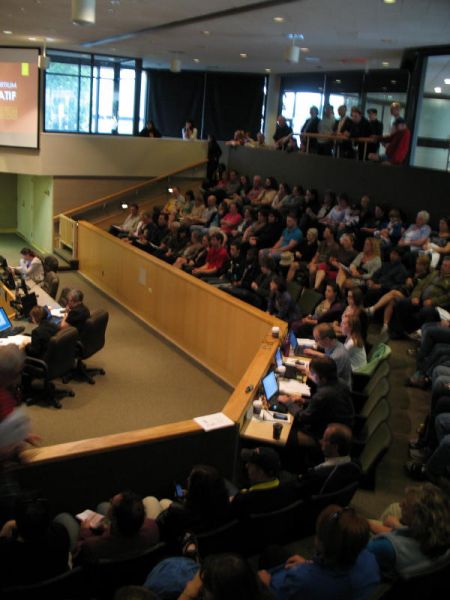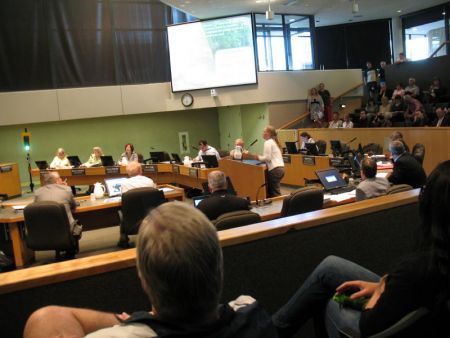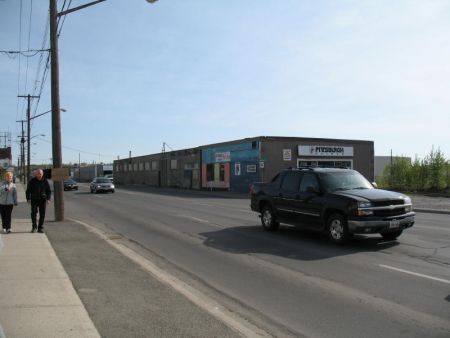People filled Council Chambers and overflowed into the lobby at the June 18 public input session for the 2014 municipal budget for Greater Sudbury. Big crowds came and went specifically for presentations on social justice, the arts, and Onaping’s community arena, while a steady full house was on hand for the many ‘green’ presentations.
Christy Knockleby and Gary Kinsman spoke on behalf of the Sudbury Coalition Against Poverty, to “argue for the importance of addressing poverty and homelessness in terms of the City budget.” Specifically, they asked that the City “maintain and increase the municipal funds going to the Community Homelessness Prevention Initiative so that it can continue funding families and individuals at the same rate” as it used to. They made the point that whether or not money is made available for social and anti-poverty is “a question of priorities and political will.” “Think of it as an investment in people,” they urged.
Wyman MacKinnon also spoke of investing in people as he asked Council to provide seed money for a Sudbury Workers Action Centre. “Victims of unscrupulous employers have nowhere to turn,” he said, adding, “we want to be known as a community where noone gets left behind.” A young woman identifying herself and all youth as ‘vulnerable workers,’ spoke compellingly about the experiences of young workers desperate to keep a job. “There are many vulnerable workers who don’t know their rights and are exploited every day,” she said.
Gordon Este, saying that he spoke on behalf of “his mother and all her euchre playing buddies,” pleaded for tax policies that protect and respect elders, such as geared to income property assessments for seniors. He argued that the community should support those seniors who are able to stay in their own homes, and that under the current system, seniors are “forced to leave their homes prematurely.”
‘Green’ issues such as water quality and sustainable transportation were the most frequently touched on, accounting for eight of the nineteen presentations. Fifteen local environmental organizations signed onto a joint submission asking the City to find funding for a community garden coordinator, acquiring important green spaces, completing watershed studies, and supporting sustainable mobility. These arose from the top four priorities of the local environmental community. Water quality, transit, cycling and walking continued to come up throughout the evening.
Lesley Flowers, of the Greater Sudbury Watershed Alliance reiterated the request for annual funding to complete watershed studies, beginning with the Ramsey Lake watershed. She referred back to the recent motion by Council to prioritize and complete watershed and subwatershed studies to allow good planning decisions protective of water quality.
Lilly Noble, on behalf of Friends of Sudbury Transit, asked Council to increase spending on transit from $47 per $1000 to $48 per $1000 of municipal taxes. They would like to see this additional funding spent on implementing a ridership growth strategy, and a pilot project giving Saturday service on Sundays. Friends of Sudbury Transit collected over 2000 signatures on a petition asking for this change. “Sunday is becoming a day like any other to shop and get to work, but people cannot take transit to get to their destinations on Sundays,” she said. They also supported the request by the Sustainable Mobility Advisory Panel for snow removal at all transit stops. “How can seniors, children and people with disabilities reach the bus stop if there is a snow bank in the way?” asked Samantha Baulch, who also asked for improvements in snow clearance on sidewalks.
The crowd murmured appreciatively as Gord Slade made a strong case for free transit service. “It’s time we did a few things out of the box,” he stated, asking the City to “throw away fare boxes and provide free bus transportation for all passengers,” and to “change the priority from service to trucks and cars to service to people, which is us.” He acknowledged it may seem like a radical idea for Greater Sudbury, but cited many European and North American cities as examples, including two Canadian cities. Benefits had included big increases in ridership, less cars on the road, less pollution, less road maintenance, environmental benefits, and cost savings for citizens, he stated, providing the clerk with a package of articles as references.
Improvements in cycling conditions were also top of mind. Rachelle Niemela, on behalf of the Sudbury Cyclists Union, asked for funding for education for drivers and cyclists, as well as an Active Transportation Coordinator staff position, as found in Thunder Bay. She strongly advocated for 1% of the capital roads budget to be devoted to priority on-road cycling infrastructure to complete priority projects such as the Elgin Greenway. The Elgin Greenway was also championed by Rainbow Routes Association and the Sustainable Mobility Advisory Panel.
Arts groups had also come together to make a joint submission, under the newly created Creative Consortium Créatif. They asked for significant additional City funding for arts groups, citing an OMBI benchmark report which ranked Greater Sudbury second last in cultural funding in Ontario. They brought an impressive crowd in support of their request. One third to one half of Council Chambers emptied out after their presentation, but quickly filled again with people who had been waiting in the lobby.
Not present at the meeting were the Greater Sudbury Taxpayers Association, who had slotted 4 speakers in a row in the 2013 budget consultation. Like last year, there were also very few individual speakers. Almost all presentations were affiliated to community groups. For both the 2013 and 2014 public input sessions, approximately ten percent of speakers were individuals coming forward on their own, compared to ~ 28% in the 2011 public input session. The reason for this is unclear. A change to a June date is one possibility. This gives staff more time to consider suggestions from the public, but also places the public input session in the summer, when public awareness and attendance is often expected to be lower. Other changes that may be related is the growing number of community groups representing citizen’s interests, and the current atmosphere of austerity.
The one standing ovation of the evening was given by supporters of the I.J. Coady Memorial Arena in Onaping. Steve Bastier spoke on behalf of Onaping residents who were there to fight to keep their arena open. A recent city report recommended the closure, citing low usage. Anger over reduced services and closures after amalgamation was evident. “We see a trend for closures of all services, this is unacceptable,” he declared. Bastier’s frustration was palpable as he described inconsistent information in the report advising the closure, and the lack of an opportunity for Onaping residents to respond and have input into the decision. His plea to be listened to ended abruptly, when the microphone was turned off after the 5 minute limit. The chair of the Finance Committee, Councillor Terry Kett, curtly told him he was “off-base” and “out of time.” Kett reminded Bastier that he was speaking to the Finance Committee and questioned, “what is the ask”, to which Baster replied, “don’t close our arena.”
The presentation touched a chord among others. “Really upsetting was the two representatives from Onaping facing the possible closure of their arena trying to make the point of the importance their arena means to their small community. We are a city of people not a bottom line on a city managers balance sheet. Please don't forget this,” Glenn Murray posted on Facebook.
Murray also wrote, “The only downer was at the end when Councillor Kett made a comment on our how low our tax rate increase is compared to other Ontario cities and it has occurred to me, and no doubt others, that the Council and the Citizens are not on the same page at all. Council's main goal seems to be to keep the tax rate increase as low as possible. The citizens, on the other hand, want to see an improvement in services. Memories are short in politics. It wasn't very long ago when we were blaming Mayor Gordon's holding the tax increase to zero for several years for the mess our infrastructure is in now.”
He was referring to Kett’s cautionary closing remarks that "there is a cost to all these very very good ideas", which collectively would result in a 3.3% increase in tax rates, which “noone wanted.” This was a stark reminder of the limits of a budget process looking at line by line expenses, which is not conducive to incorporating the shifts in priorities requested in most of the submissions. This approach also leaves out longer term consequences. Many groups presented evidence of the wider and longer term savings expected with investments in a healthy community.
A copy of written submissions and power point presentations can be found on-line here, here, and here. Budget deliberations will continue into the fall and winter, with final approval expected in January of 2014. Written submissions will be accepted until the end of the day, Friday, June 21, and can be submitted on-line, by e-mail to clerks@greatersudbury.ca, or at the clerk office (2nd floor, Tom Davies). . A summary of how municipal tax dollars are spent can be found here.
Naomi Grant chairs Coalition for a Liveable Sudbury, and presented a joint submission on behalf of 15 like-minded community organizations, based on the top four priorities of the local environmental community.


